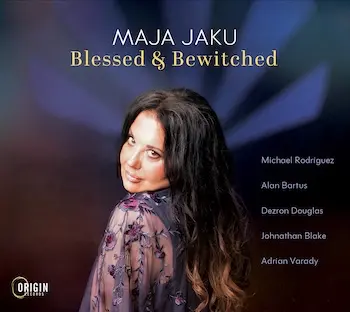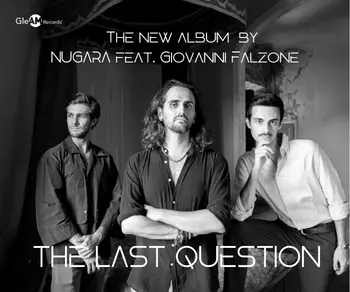Larry Coryell, Badi Assad, John Abercrombie: Three Guitars (Chesky Records EVSA2981S)
The CD version of this unusual session (recorded in St. Peter’s Church in the Chelsea district of New York City in 2002), contains 13 tracks, the LP issue only nine.
Larry Coryell and John Abercrombie are known respectively as pioneer guitarists in the spheres of fusion and progressive jazz; John Abercrombie, well represented on the ECM label, developed a unique, softer and delicate musical style that received critical acclaim. He was invited to participate in the session despite not having played acoustic guitar for three years prior to this recording. The lesser-known Badi Assad is a Brazilian guitarist, flautist and vocalist.
All three contributed compositions for this date. Assad’s Seu Jorge E Dona Ica (a six-minute work) opens the proceedings and she initially accompanies her fellow guitarists’ proceedings on an instrument called a kalimba. Coryell’s New Lute Prelude (inspired by the late Laurindo Almeida) and Exercise In Fourths are intricate compositions, performed with empathy by his two colleagues. Abercrombie’s Soundtrack and Descending Grace add to the variety of the combined sounds and nuances.
Coryell has described the session as a “unique intersection of creativity” while Abercrombie reported that “everyone was so easy to work with, which takes away a certain pressure”. Reviewers have either endorsed these verdicts or judged the music lacking in group or jazz feeling and interplay. Again, the project suffers from the differing backgrounds and experiences of the co-equal guitarists. I don’t expect to be listening again to what Charles Waring in a detailed accompanying essay calls “a transcendent communion of kindred spirits”. My own response is a slight adaptation of Philip Larkin’s collected record reviews: All What Jazz?
Mongo Santa Maria: Go, Mongo! (Descarga 637009 LP)
Ramon “Mongo” Santamaria Rodriguez was born in Havana, Cuba in 1917 and died in Miami, Florida in 2003. Based in New York City from 1950, he is remembered as a popular and talented Cuban percussionist. He is heard here before his 1963 recording of Herbie Hancock’s Watermelon Man which brought him to fame and attention. But he had already participated on albums led by Tito Puente, Chris Connor, Cal Tjader, Johnny Hartman and Victor Feldman. He also composed the jazz standard Afro Blue (performed here on a bonus track from an appearance at San Francisco in 1959), also notably recorded by John Coltrane.
Mongo composed most of the material on this early album, released in 1962 on the Riverside label. It featured the 21-year-old pianist Chick Corea on his official recording debut, Brazilian singer Carmen Costa, and “voices”. Trumpeter Paul Serrano and Pat Patrick and Al Abreu, saxophones and flute, add colour to the vibrant proceedings.
The man himself is the featured soloist on Carmela and Congo Blue, and is a hypnotic rhythmical presence throughout. Later, in 1980, he recorded with Toots Thielemans and Dizzy Gillespie for Pablo at Montreux.
This is not by any measure the definitive Mongo album – try Skin On Skin: The Mongo Santa Maria Anthology 1958-1995 (Rhino 1995) or Mongo Returns (Milestone 1995) – but this is a pleasing introduction to his developing percussive and compositional skills.
Junior Wells: Cut That Out (Blues Joint 8035 LP)
Born Amos Wells Blakemore Jr, Junior Wells (1934-1998), harmonica and blues singer, grew up in West Memphis, Tennessee. He recounts that as a child he purchased a harmonica from a pawnshop for $2 but paid only a dollar and a half and neglected to pay the balance. Hauled into court, the judge asked him why he had done that. “I told him I had to have that harp. The judge asked me to play it and when I did, he gave the man the 50 cents and hollered ‘Case dismissed!’”
In 1948 he moved with his divorced mother to Chicago where he began sitting in with local musicians. In his long subsequent career, Wells recorded with such blues luminaries as Muddy Waters, Otis Spann and Willie Dixon for a variety of labels. He was also a charismatic stage performer. Mick Jagger has been quoted as saying that Wells “was a great harp [harmonica] player. He was one of my influences.”
The 19 tracks on this LP are taken from his earliest – and many critics say – most inventive period. Including Messin’ With The Kid, Hoodoo Man, Two Headed Woman and The Things I’d Do For You, they will appeal to devotees of Mississippi-derived Chicago blues. Unfortunately, I am not in that number, and find the songs, sentiments and his voice repetitive and monotonous. But don’t take my word for it. Try the title track Cut That Out.




